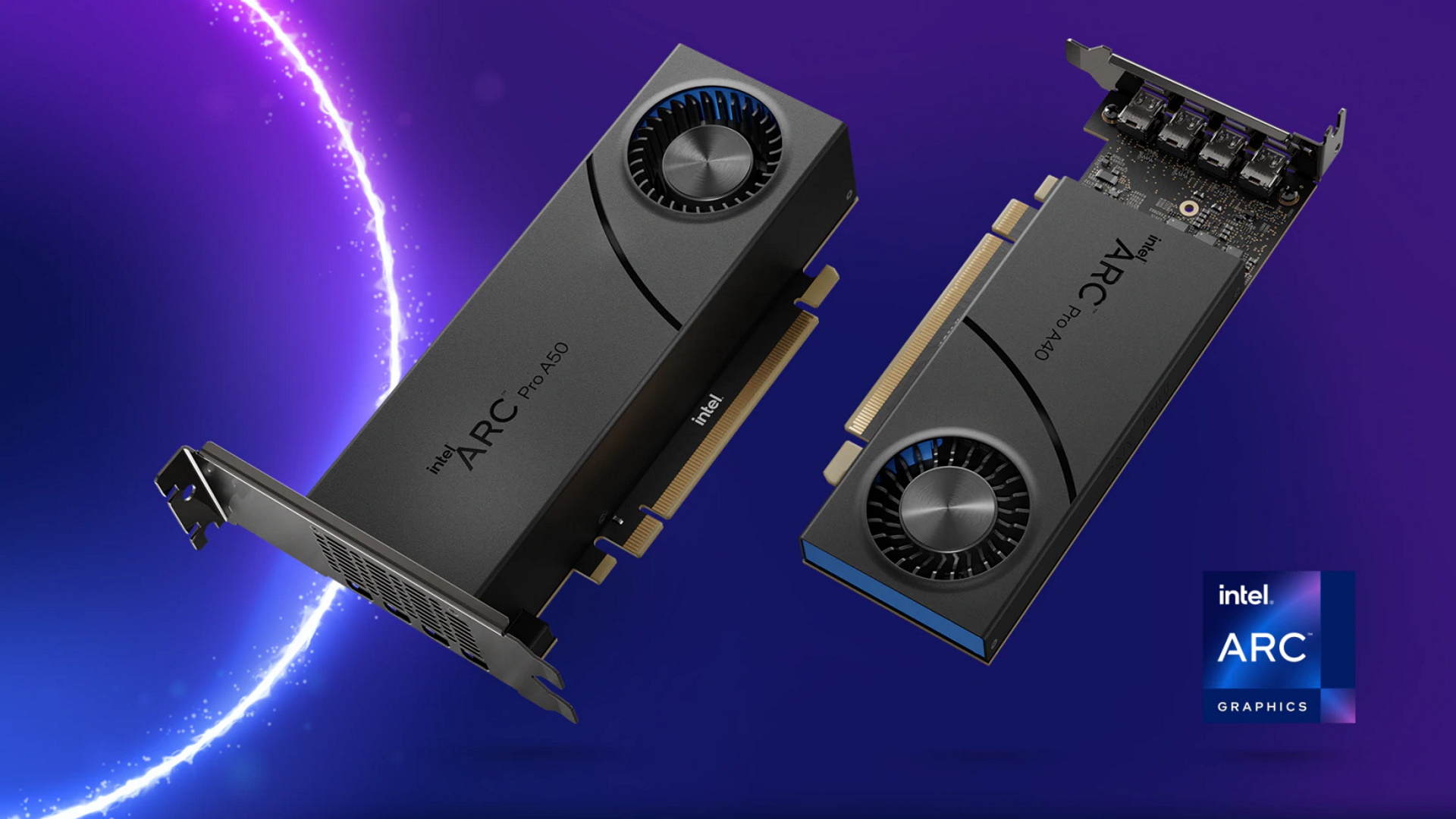Intel gets serious with its Arc Pro A-series GPUs
Workstations and laptops get some professional-grade hardware love.

In a surprising move given the state of the graphics market right now, Intel has unveiled its professional graphics card line-up. Covering both mobile and workstations, the new Arc Pro GPUs are aimed squarely at professionals and will be looking to get the all-important certification from leading professional applications.
There are two desktop products for workstations, with the Arc Pro A40 being a single slot card and the more powerful Arc Pro A50 being a dual-slot offering. The A30M is aimed at the mobile space and offers similar performance to the A40, albeit with less local memory. The specs for these new GPUs are as follows:
| Row 0 - Cell 0 | Intel Arc Pro A40 | Intel Arc Pro A50 | Intel Arc Pro A30M (Mobile) |
| Peak performance | 3.5TFLOPs | 4.8TFLOPs | 3.5TFLOPs |
| Xe-core | 8x Ray Trace Cores | 8x Ray Trace Cores | 8x Ray Trace Cores |
| Memory | 6GB GDDR6 | 6GB GDDR6 | 4GB GDDR5 |
| Display outputs | 4x mini-DP 1.4 | 4x mini-DP 1.4 | Laptop specific |
| Power | 50W Peak Power | 75W Peak Power | 35–50W Peak Power |
It's interesting that Intel is pushing the ray-tracing capabilities of these cards, although we don't actually know how these fair when compared to the Nvidia and AMD competition at this point. It also highlights the fact that its GPUs support AV1 hardware acceleration, which genuinely does look pretty sweet, but we need to see how this performs in person before getting too giddy about it.
The reason this is of interest to us PC gamers is that this is a serious move from Intel and one that isn't undertaken lightly—not only is getting the software accreditation for professional cards expensive, but it indicates that Intel is in this for the long haul. Given its Arc Alchemist GPUs are still currently only available in China, and the fact that it's clearly having issues with its legacy DX11 support, you'd be forgiven for thinking that its new GPU launch wasn't exactly going to plan. This unveiling should reassure you that it's serious, even if it isn't directly related to the consumer GPUs we've been waiting for.
Well that and the fact that the successor to Alchemist, codenamed Battlemage, is already in the works. Plus, Intel has been ramping up info before the global release of its Arc Alchemist consumer GPUs recently. Its candid talks to camera have been refreshing, although at this point it'd be great if it just started shipping graphics cards.
There's no indication of pricing for these new "Pro" cards, or indeed when we'll be able to buy them, beyond a suitably vague "available starting later this year from leading mobile and desktop ecosystem partners." Not that you'd want to buy such GPUs for gaming, as those drive optimizations do mean far higher price tags.
Keep up to date with the most important stories and the best deals, as picked by the PC Gamer team.
Alan has been writing about PC tech since before 3D graphics cards existed, and still vividly recalls having to fight with MS-DOS just to get games to load. He fondly remembers the killer combo of a Matrox Millenium and 3dfx Voodoo, and seeing Lara Croft in 3D for the first time. He's very glad hardware has advanced as much as it has though, and is particularly happy when putting the latest M.2 NVMe SSDs, AMD processors, and laptops through their paces. He has a long-lasting Magic: The Gathering obsession but limits this to MTG Arena these days.


